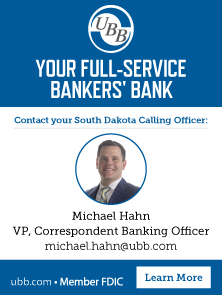- Education & Events
- Advocacy
- Products & Services
- Membership
- Resources
- SDBANKER Magazine
- SDBA eNews
- SDBA eNews Archives
- Legislative Update/Bill Watch
- South Dakota Bank Directory
- Women in Banking
- Scenes of South Dakota Calendar*
- Holiday Signs
- Regulatory Report
- South Dakota Banking Code
- Record Retention Manual
- Advertising & Sponsorship Guide
- COVID-19 Resources
- Mental Health and Crisis Prevention
- About
|
SDBA's 2023 Women of Impact Nominations Open Until August 1Plains Commerce Bank v. BeckBy Brett Koenecke, SDBA Legal Counsel, May AdamThe South Dakota Supreme Court recently handed down an opinion that has impacted the South Dakota banking and trust industries. We think it important to call to your attention and to direct you to your bank counsel for advice. The Beck case affects not only new loans but also loans you have in existence where trust assets have been pledged to secure a loan to a borrower other than the trust. In the instant case Plains Commerce Bank, Inc. v. Beck, 2023 SD 8, the facts were as follows: In 1999 Gary and Betty Beck created B&B Farms Trust as an irrevocable spendthrift trust. They named their three children as secondary beneficiaries and held themselves as primary beneficiaries. Their youngest child, Matthew Beck, served as Trustee. In 2015, Matthew, in his capacity as Trustee, mortgaged $800,000 worth of the Trust’s real estate as partial collateral for a loan from Plains Commerce Bank. At the direction of Plains Commerce, Matthew obtained written consent from all the beneficiaries to the Trust for him to mortgage the Trust property. He also obtained a ratification from the Grantors as to his intended acts of mortgaging that trust property. All persons involved in the trust were advised by counsel and gave consent to the arrangement. In 2018, Matthew defaulted on the loan. In response, Plains Commerce commenced a foreclosure action against Matthew in his personal capacity, and against Matthew as Trustee to the Trust. Matthew’s sibling, Jamie, filed a motion to intervene on behalf of B&B Farms Trust, stating that her brother had engaged in self-dealing and there was a conflict between his personal interests and his role as Trustee. The Circuit Court in Aberdeen ruled that the trust could not be foreclosed upon and also ruled that Jamie was entitled to attorney’s fees as the prevailing party in a foreclosure action. Bank appealed. How did the Court rule?The South Dakota Supreme Court affirmed in part and reversed in part, and opined on five issues; At the request of Plains Commerce, the SDBA weighed in on issue five by filing an amicus brief in support of the bank. We argued alongside bank counsel that the circuit court had incorrectly awarded attorney’s fees to Jamie for “prevailing” in the action. Jamie asserted that attorney fees are awarded to a borrower or other party who prevails when there is a foreclosure action based on her interpretation of SDCL 15-17-38. The Supreme Court denied that, deciding it would be against public policy to permit an award of attorney fees to a prevailing party who was not the lender in a foreclosure. Although the Court got it right in issue five, the rest of the determinations made were very unexpected. The Court ruled that despite the Trustee obtaining consent from all the Beneficiaries, and a ratification from the Grantors, those acts were insufficient to permit Matthew to mortgage Trust property to secure his personal debts. Rather, the Court determined that the consents only applied to a single transaction and could not alter the Trust Agreement itself. The justices further determined that that regardless of consent, Matthew was a beneficiary, and the spendthrift provision did not permit him to use his future interest in the trust as collateral for a personal loan. The Court viewed this as a form of self-dealing done by a beneficiary, which is prohibited under South Dakota law. How should banks proceed after Plains Commerce v. Beck?In Beck’s wake, we have consulted with bank counsel about facts of the matter. We find no fault with the bank’s actions preceding the loan closing. The bank reviewed the Certificate of Trust and the Trust Agreement with its own counsel, advised the borrower to obtain written consent upon advice of counsel from the interested parties, and obtained a ratification from the Grantors. After Beck, we feel that there are practical changes that banks should consider. We know that many borrowers with trusts in place wish to see the trust assets leveraged for the benefit of the beneficiaries in the ongoing business organization or farm operation. It seems clear to us that a bank should advise any borrower, who is a trustee or beneficiary to a trust, wanting to use trust assets as collateral for a mortgage, to speak with counsel about Beck and the language in their particular trust agreement. The Supreme Court made much of the fact that the bank had reviewed the entire trust agreement and was on actual notice that the trust agreement did not allow the trustee to mortgage the trust property for his own benefit. Under statute, the bank (and anyone else) is entitled to rely on a trust certificate and the representations made therein. A certificate of trust executed under § 55-4-51 may be recorded in the office of the register of deeds with respect to land described in the certificate of trust or any attachment to it. If it is recorded or filed in any county where real property is situated, or in the case of personal property, if it is presented to a third party, the certificate of trust serves to document the existence of the trust, the identity of the trustees, the powers of the trustees, and any limitations on those powers, and other matters the certificate of trust sets out, as though the full trust instrument had been recorded, filed, or presented. Until amended or revoked, or until the full trust instrument or will is recorded, filed, or presented, a certificate of trust is conclusive proof as to the matters contained in it and any party may rely upon the certificate, except a party who has actual knowledge of the facts to the contrary. SDCL 55-4-51.1 It’s clear that the Court put a tremendous emphasis on the last sentence in that statute and on the notion that once the bank had seen the entire agreement, the ability to rely on the trust certificate was lost. I recommend using the statute cited above to rely on the representations made by trustees and their counsel in a certificate of trust in order to perfect and secure loans made involving trusts. It could be however that the bank needs to review (or already has reviewed, in the case of existing loans) the entire trust agreement. In those cases, be aware that if there is a spendthrift provision in the trust agreement, which is quite common, we would generally recommend that the bank direct borrowers counsel to amend their trust to conform to the bank’s interests in the wake of the Beck case. You might include in the conversation with borrowers the following language as a sample: “Notwithstanding the spendthrift provisions located at ¶ __ and other provisions in this Trust agreement, it is Grantor’s intention that the assets held in this Trust be made available for use as collateral for loans made by others to Grantors, Trustees, or Beneficiaries, upon written consent by all interested parties.” It’s my observation that responding to Beck and reworking existing loans which are affected by it is work in which one size does not fit all borrowers/banks. Each trust agreement, each loan, each borrower, each family is different. There is no substitute for the advice of bank counsel as to each specific situation. With some study and thoughtfulness, you should be able to navigate this matter going forward. Consult your bank counsel and take action sooner than later. Submit Your Photos for a Chance to be Featured in the 2024 SDBA Calendar |





